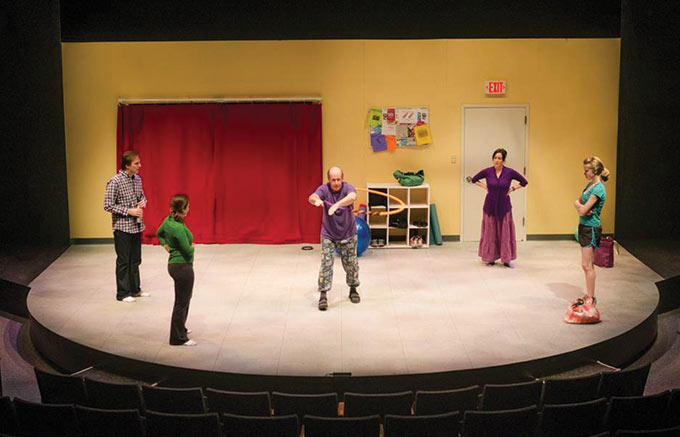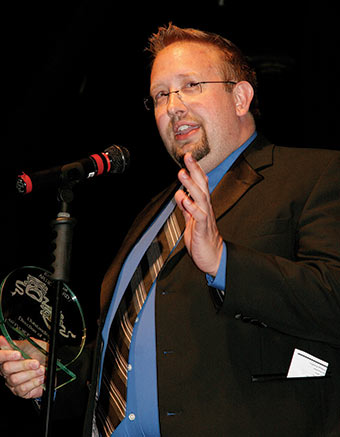The Man With a Plan
by Anthony Chase


Scott Behrend of Road Less Traveled on what it takes to run a theater company producing new work
It has been thrilling to watch the steady 10-year rise of Road Less Traveled Productions. Fueled by a diet of high risks and bold gestures, the theater company has worked to engage its audience with new work by local writers, and plays by internationally celebrated American masters that have never been seen in Buffalo. Edward Albee attended a performance of his play The Goat at Road Less Traveled; Eric Bogosian attended Humpty Dumpty; Stephan Adly Guirgis saw The Last Days of Judas Iscariot, A.R. Gurney saw Ancestral Voices—and all were pleased with what they saw.
Behrend has also forged a relationship with Alec Baldwin, star of stage, screen, and television, who has performed in two readings for RLTP as fundraiser: Yasmina Reza’s Art and Clifford Odets’s The Big Knife.
Road Less Traveled Productions is certainly ambitious.
This week, the company embarks on a brash new venture, becoming the first local theater to present a fully staged theatrical production at 710 Main since Studio Arena Theatre vacated the premises in 2008.
The play will be the Buffalo premiere of Annie Baker’s endearing Circle Mirror Transformation, the story of a mismatched group of small-town folk who enroll in a six-week acting class. How do a flirtatious former actress, a petulant 16-year-old, a hippie husband, and a divorced carpenter find common ground? Why through creative collaboration, of course!
When the play debuted at Playwrights Horizons it New York City, it won the 2010 Obie Award for Best New American Play and was voted one of the top 10 plays of 2009 by the New York Times, Time Out New York, and The New Yorker. It was also named one of the best plays of 2009-2010 in The Best Plays Theater Yearbook. Road Less Traveled will stage the play concurrent with the debut of Baker’s newest play, The Flick, about employees at an old-style movie theater, which opens at Playwrights Horizons on February 15.
Such events do not generally happen haphazardly.
“I like to have a plan,” explains Behrend.
Indeed, following a plan has been the theme of his life. His career in the theater began when he was a child, acting in elementary school plays.
“I wanted to be a professional child actor,” he reveals, “but my mother said, ‘No.’ I was in Wagner’s Das Rheingold at Artpark, dressed in a burlap sack and carrying gold Styrofoam bricks from one side of the stage to the other. I enrolled in the summer theater program they used to have at the Buffalo Seminary. Then I went to Amherst High School, where they did three shows a year. It was a very active time there, and a lot of people were inspired to work in the theater. Kristen Tripp Kelley went there. Paul Todaro went there. Matt Witten and I became close friends in high school. Of course, he always got the leads. When Matt was Arthur, I was Merlin. When he was Sherlock Holmes, I was Dr. Watson. Eventually I got the idea that I wasn’t that great an actor, but I loved the theater. During my senior year, I directed my own adaptation of Dracula, and, of course, Matt was Van Helsing. That, I really enjoyed! John Rickus was the lighting designer and he’s still my lighting designer—I’d be lost without him.
“I did a six-week pre-college program at Carnegie Mellon, and it was there that I really decided that I would do theater for a living.”
For college, Behrend went to Syracuse University and majored in scene design. Again, he modified his plan.
“Before I graduated I realized there was no way I could spend the rest of my life as a scene designer. I got myself into graduate courses while I was still an undergraduate and began to plan to pursue an MFA in directing.”
That was the plan, anyway. Behrend returned to Buffalo to get his bearing and regroup.
“I expected to do what my friends were doing,” says Behrend. “Move to New York, or Chicago, or Los Angeles. That summer I worked for my father, painting houses and stuff. He was a high school guidance counselor, but in summer we did contracting. That’s how I got my handyman skills, and they were very useful when I was in set design.
“I never expected to stay in Buffalo, but in the early ’90s, theaters were really booming here. That’s when many theaters like MusicalFare and the Irish Classical were really getting started. I took my portfolio around, and in two weeks I was offered five shows. The guy who the Irish had lined up for the year had quit just the week before. My first show there was Oscar Wilde’s An Ideal Husband, which we did at the Pfeifer with Paul Todaro, from Amherst High. I was their resident designer for three years.”
Still, Behrend wanted to get more into directing.
“Richard Lambert gave me my first professional directing job at New Phoenix Theatre. The show was [Joe Orton’s] Entertaining Mr. Sloan. That’s been an important play for me. Years later, I met Alec Baldwin when I was assistant director on the New York revival of Entertaining Mr. Sloan.
“I did some shows at the Phoenix and then did the applications and interviews for MFA programs. But people would say, ‘You’re on the right track, come back when you’re 30.’ I was really depressed after that. My plan had failed. I looked for internships, but all the major internships required an MFA. In addition, all the directors I had known when I was taking graduate courses at Syracuse had moved to New York and no one was working. These were talented people, too. That put a whole different spin on things.
“I was tired of living at home and not doing what I wanted to be doing. One of my friends in New York and I had a conversation about new plays. He said that in New York, the only way to get rights or avoid huge royalties was to do new work.
“That got me thinking. There were ways to adapt this idea for Buffalo. I called Jon Elston. We had done a film project together that had derailed our friendship, but I knew we could work on this. I said, ‘This is what is going to happen. You’re going to write plays even though you have never done it before. I am going to direct them and we are going to start our own theater company, producing new work. It is cheap to produce in Buffalo. We’ll grow the company here and then, eventually, we’ll ship shows out of Buffalo and that’s how we’ll make money.’”
That’s still the plan.
The idea of Road Less Traveled is to be an incubator of new work, and also an exporter of new work. Various components of the company support this mission, including the Emanuel Fried New Play Workshop, and membership in the National New Play Network, a consortium of theater dedicated to producing new work.
“I feel now that we have a community of local playwrights,” says Behrend. “They talk to each other, they support each other.
“And the National New Play Network is our national component,” he adds. “Often it is so difficult to get that second production, and it is typically in the second or third production that the most important work gets done. In this organization, we can exchange scripts to support playwrights. Jon and I went to the organization’s conference in Philadelphia where people shot plays and if three theaters pick up a script, they can share the world premiere and get funding from the organization.
“The idea is to help a play build a head of steam through regional productions,” he explains. “That used to be the idea of the road or of regional theaters, but now, it seems that most plays of note originate in New York. This is a way to break through that system and give other cities some influence. [Lydia R. Diamond’s play] Stick Fly is an example of a play that gained momentum in regional productions before New York.”
A production of Stick Fly, directed by Willie W. Judson, Jr. will open at the Paul Robeson Theater on February 8.
Insidious by Ibn Shabazz is an example of a play that did well for RLTP and then went to Black Rep in St. Louis. Behrend hopes that the network will help make that happen more often.
Mention of Insidious, which featured African-American characters in a play by an African-American playwright inspires Behrend to talk about another important priority for him at Road Less Traveled: developing a diverse audience.
“I think a lot about seeking that universal audience,” he says, “and by that, I mean an audience that is not racially segregated the way Buffalo is, but reflects our growing diversity. I think it is important for the audience to reflect on the many voices of our society.”
While Behrend is skilled at giving his theater the best possible spin, he happily admits that the challenges remain enormous.
“Some people see Edward Albee in our audience or Alec Baldwin doing a fundraiser and they assume we’re rolling in cash. We’re not.”
Of course, there is a note of disingenuousness to this objection.
From the beginning, Behrend has made every effort to create the illusion that the Road Less Traveled plan was far more advanced than it is even today. In truth, Road Less Traveled has yet to move a play from their stage to national prominence in the way that, for example, Steppenwolf Theatre of Chicago was able to do, repeatedly, beginning with their production of Sam Shepard’s True West, starring Gary Sinise and John Malkovich, when their company was only a few years old. Some might note that those who study audience development have long looked upon the holy grail of the “universal audience” as a myth—all audiences are somehow coded by common experience. Moreover, in making the move from the intimacy of the Road Less Traveled Theatre in the Market Arcade Cinemas to 710 Main—a theater several times its size—the company leaves itself vulnerable to playing to a lot of empty seats.
Still, Behrend has been able to attract many believers and remains undaunted.
“I would like to be like Steppenwolf,” he agrees, “but it’s a slow process. It took us nearly 10 years to hit our stride. It was only two years ago that I became a full-time employee of Road Less Traveled. I’ve been blessed because the timing in which I’ve been working, and because of the people who have been supportive of me and us: Steven McKinley Henderson and Alec Baldwin, but so many others as well. The network we’ve been able to build. We’ll see what happens. One thing I can tell you. This experience has taught me to have great respect for anybody who has ever started a theater.”
Circle Mirror Transformation opens at 710 Main Street on Friday. Call 629-3069 for tickets.
|
Issue Navigation> Issue Index > v12n5 (Week of Thursday, January 31) > The Man With a Plan This Week's Issue • Artvoice Daily • Artvoice TV • Events Calendar • Classifieds |









 Current Issue
Current Issue